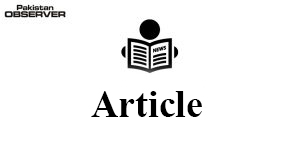Shaukat Hayat
THE International Day of Non-Violence has passed. The first proposal to celebrate this day globally on October 2 was first made by Iranian Nobel Laureate Shirin Ebadi in 2004 and on June 15, 2007 the UN General Assembly declared October 2 as the International Day of Non-Violence which was unanimously adopted by 143 countries. According to the UN Charter, the main purpose of celebrating the International Day of Non-Violence is to establish peace among the Nations, end intolerance and promote non-violence so that mutual disputes can be resolved through peaceful dialogue. Violence refers not only to conflicts between nations, but also to domestic violence, from school and madrasa to students, parents to children, men to women, police officers and employers to employees.
There are many types of violence, physical violence, mental violence, sexual violence and psychological violence, the main causes of which are sexual discrimination, religious hatred, sectarianism, racial discrimination, linguistic grouping, intolerance and class discrimination. Non-violence is not only the name of the absence of war and the establishment of peace, but also the formation of a political and social system in which every human being, without any discrimination, guarantees the protection of his basic human rights.
The presence of any kind of violence anywhere in the world has a profound and dangerous negative impact on the individual and collective life of the people there, leading to a very dire situation for the whole society. And development is affected, the name of governance is erased, respect for the law disappears, the state writ is weakened, the weak and the poor are punished, the powerful become gods on earth. And so society reflects the law of the jungle. In this whole context, if we look at the situation of the Kingdom of God, the scenario is very frightening. On the one hand, the country is under the pressure of a possible war on its external borders, but internally, with each passing day, such horrific events are taking place that the human brain comes to the fore.
If we look at the daily newspapers, 15 out of 20 news stories are based on violent incidents, property disputes, relationship tensions and honour killings, sexual violence against women and children, incidents of harassment, forced labour, kidnapping for ransom. There are reports of theft, robbery, extortion and enforced disappearances. The unfortunate point is that in this whole situation, the role of the state institutions is nowhere to be seen. Whether it is murder, sectarian violence or religious hatred, hundreds, if not thousands, of such tragic and heartbreaking incidents have been taking place in the Kingdom of God in Pakistan, which has affected not only the state institutions but also the collective role of the entire society. Similarly, it is true that the protection of the basic human rights of every citizen is the responsibility of the state, but does every individual in the society also has a responsibility or not, or we, as always, are responsible for every tragedy that happens to the state and we will continue to adopt the method of acquittal by putting it on state institutions.
Where the responsibility lies with the state institutions, we will continue to dare to demand justice, which is our constitutional right, but when will we fulfil our responsibility as ordinary citizens, social or political activists, as parents and teachers? How long will we continue to ignore our moral obligations? If we do not fulfil our responsibility properly, how can we question the role of the state? Many national and international human rights organizations have emerged and are working to prevent violence and human rights abuses. Political parties have more responsibility than state institutions to end violence and promote non-violence because as long as there is no political will, these problems will continue to grow instead of being solved and society will look like a wild society instead of a human society.
—The writer is freelancer, based in Buner, Khyber-Pakhtunkhwa.










